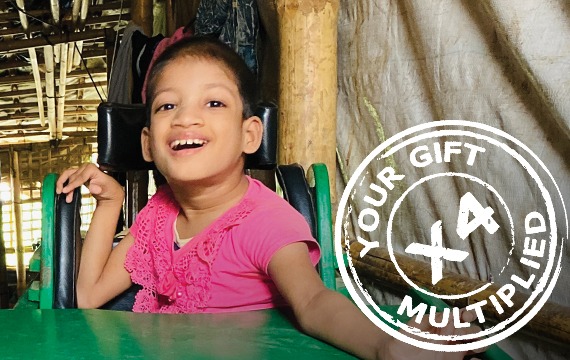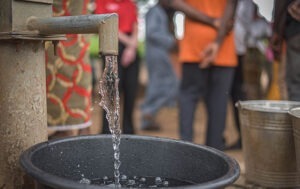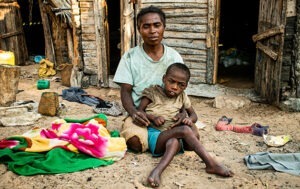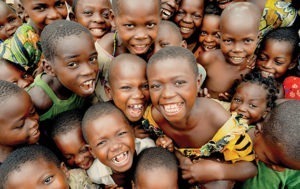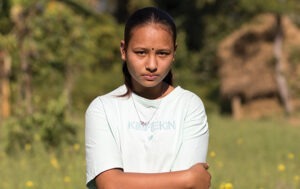Harisa
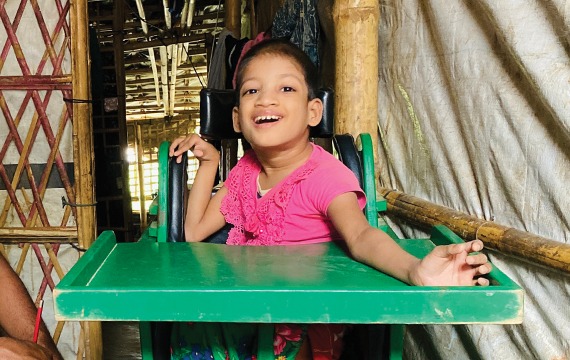
Help create a life-changing oasis for children and adults in the overcrowded refugee camps of Cox’s Bazar, Bangladesh.
Your gift in support of the Rohingya refugees will be multiplied x4!
“And now these three remain: faith, hope and love. But the greatest of these is love.” – 1 Corinthians 13:13
Your great love for people with disabilities is having remarkable results in challenging places around the world – like the Rohingya refugee camps situated on the storm-swept coast of Bangladesh.
These crowded sand dunes covered in blocks of makeshift shelters have been home to 9-year-old Harisa since almost a million Rohingya refugees fled from Myanmar in 2017.
Harisa’s parents carried their little girl all the way to safety, because her tiny body was locked in the grip of cerebral palsy. Harisa could not walk, talk or even make eye contact.
Harisa’s parents never stopped looking for a way to help their beloved daughter. And thanks to the loving kindness of people like you, they found it!
The family discovered this great ministry of love towards Rohingya refugees with disabilities. As you will see, Harisa’s results are almost miraculous.
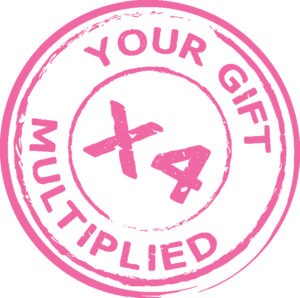
Please help create a life-changing oasis for children and adults in the overcrowded refugee camps of Cox’s Bazar, Bangladesh – and our Government will help – multiplying the gift you send today x4!
The family is so grateful to people like you. “It was you,” says Harisa’s mother Noor. “Your service and dedication has brought so much improvement to my daughter.”
The key to unlocking Harisa’s rigid muscles and movement has been the remarkable work of the cbm-funded speech and language therapist supported by generous people like you.
Many of Rohingya’s young ones have been shocked and traumatised into silence due to the circumstances they have grown up in. But this skilled speech therapist is helping them find their voices.
Your gift today can help continue this great work and will be a blessing to Rohingya’s refugee children.
Harisa’s case, though, was even more difficult because of her cerebral palsy. All her fine facial structures designed for speech were tightly locked down by her rigid disability.
Consider how easily and fluently you speak. All the many parts of your face work together flawlessly to create speech. Not so for Harisa.
Harisa’s world was her floor – unable to move, unable to relate to others and unable to speak.
We are so grateful to kind people like you, for caring about children like Harisa. Look at what her speech therapist has been able to do.
“I applied muscle relaxation techniques: hot and cold stimulation to help her get rid of rigid muscle movements. I started oral motor exercises that include lips, jaw, tongue, cheeks and associated areas.”
“She also had trouble swallowing, so I applied swallowing exercises, chin tucks and throat movements. I have helped correct her overall posture, and altered her food to make it easier for her to swallow.”
It is impressive to see the detailed attention Harisa received. This skilled speech therapist, working patiently through sheer compassion for this little girl trapped inside her own body.
This is wonderful life-changing work, worthy of prayers and support. Please send your gift today – and see your impact multiplied x4 by our Government’s Aotearoa New Zealand International Development Cooperation Programme.
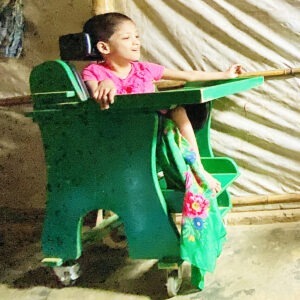
It soon became clear that the speech therapist needed to do much more than help Harisa to speak. Having been isolated by her disability for so long, Harisa had never progressed beyond a pre-verbal level.
The speech therapist had to help Harisa put together the mental building blocks of childhood: how to relate to others; how to play; to make eye contact; to pay attention; to take turns.
“Without these she might have developed severe behavioural problems,” the speech therapist explained. And then with confidence: “the possibility of that has now been eradicated!”
Faith, hope and love have won! Amazing things have happened. Harisa’s rigid jaw and tongue have been loosened. She has learned to speak! The exercises have produced rapid change in her.
The exercises are hard, but both of Harisa’s parents are committed to practicing them all with her, as much as possible.
Harisa has also received assistive devices: a spirometer to track the increasing strength of her lungs; with puzzles to stretch her developing mental skills.
Her recovery has been faster than anyone expected. Her speech therapist says, “Harisa has started developing understanding and socialisation. She is grateful for her growing communication skills. So are her parents.”
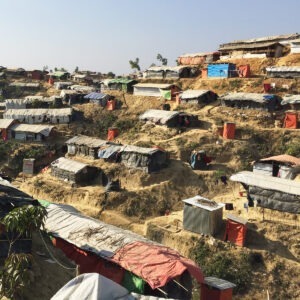
Cerebral palsy is not something Harisa can ever walk away from, but thanks to people like you she can talk, relate and love. You have given her new life and everyone who loves her is very thankful to generous people like you.
The Rohingya people are so resilient, living at the sea’s edge in Bangladesh – with floods and earthquakes on one side, and some of the world’s worst ocean storms on the other, all while fleeing persecution.
The Rohingya refugees have nowhere to call home. They cannot go back. They have no way forward. They live in bewildering camps laid out over sprawling sand dunes, just as Harisa has been trapped in her tiny body, bound by cerebral palsy.
It is a very different life living in a refugee camp. But there is hope, and it’s thanks to generous people like you who help provide quality care and such effective rehabilitation, despite the most difficult living conditions.
Please keep remembering the Rohingya people, like Harisa and her parents, in your prayers and through your generous support. As hard as it is to be a refugee, it is even harder to be a refugee with a disability.
Send your gift today, knowing it will be multiplied x4 through our Government’s Aotearoa New Zealand International Development Cooperation Programme.
Your gift will help support disability therapy, including physiotherapy, occupational therapy, speech language therapy, and hearing and vision services for children like Harisa – and adults too. It will help provide assistive technologies, including mobility devices like Harisa’s, or hearing aids and glasses. And it will support the staff – like Harisa’s speech therapist – at the camps’ Medical Centre, bringing help and healing to the minds and bodies of Rohingya refugees.
Thank you for giving children like Harisa the specialist care and rehabilitation they need.
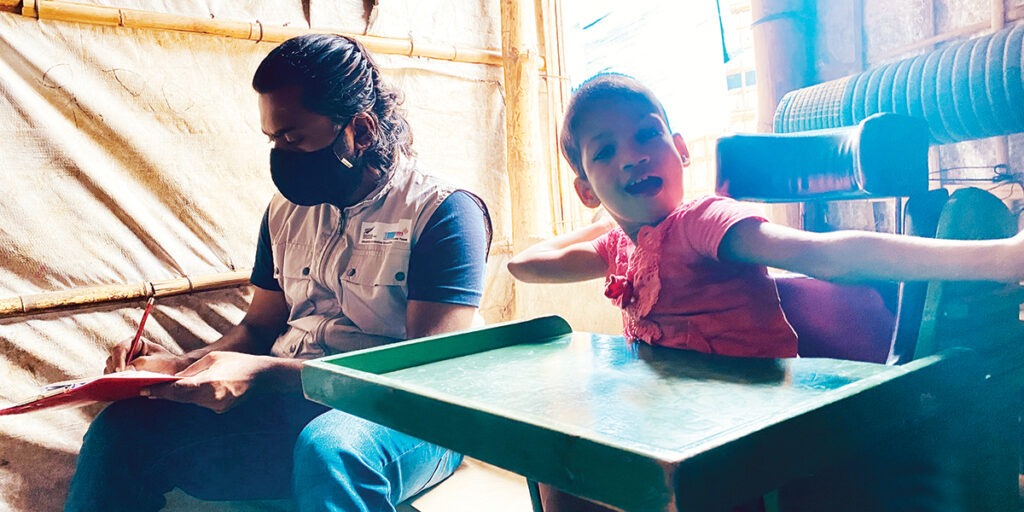
Your gift will provide the extra layer of care that children with significant disabilities require. Without you, their parents face the unbearable weight of struggling to survive as refugees, while trying to meet their children’s specific needs.
With you by their side, children like Harisa can have a far brighter future. This young girl could barely move and could not speak. Now she can talk, show her joy and share her love. Thank you for continuing to show your love, by sending your gift for Rohingya refugees with disabilities today.
You can see from her photograph that Harisa loves her life now, as she meets Imran from our New Zealand programmes team. She has her voice and greater mobility thanks to expert speech therapy and support from generous people like you.
Please keep sharing your kindness by supporting the wide range of disability services Rohingya refugees need living in the overcrowded camps, by sending your gift today. Your generosity will be multiplied x4.
